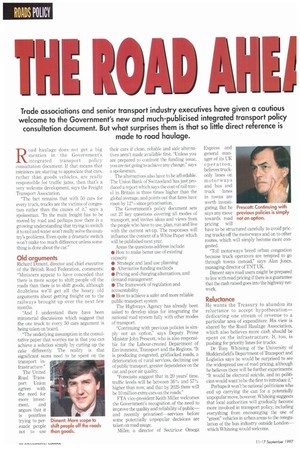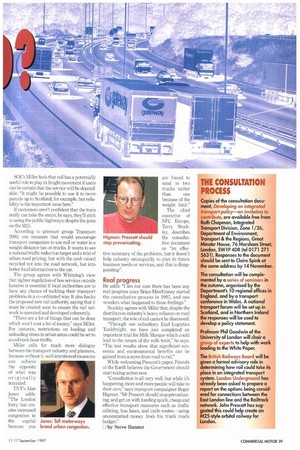1101iti
Page 50

Page 51

If you've noticed an error in this article please click here to report it so we can fix it.
Road haulage does not get a big mention in the Government's integrated transport policy consultation document. If that means that ministers are starting to appreciate that cars, rather than goods vehicles, are really responsible for traffic jams, then that's a very welcome development, says the Freight Transport Association.
"The fact remains that with 50 cars for every truck, trucks are the victims of congestion rather than the causes of it." says a spokesman. "In the main freight has to be moved by road and perhaps now there is a growing understanding that trying to switch it to rail and water won't really solve the country's problems. Even quite a dramatic switch won't make too much difference unless something is done about the car."
Old ar2uments
Richard Diment, director and chief executive of the British Road Federation, comments: "Ministers appear to have conceded that there is more scope to shift people off the roads than there is to shift goods, although doubtless we'll get all the hoary old arguments about getting freight on to the railways brought up over the next few months.
"And I understand there have been ministerial discussions which suggest that the one truck to every 50 cars argument is being taken on board.
"The underlying assumption in the consultative paper that worries me is that you can achieve a solution simply by cutting up the cake differently. The reality is that significant sums need to be spent on the transport infrastructure."
The United Road Transport Union agrees with the need for more invest ment, and argues that it is pointless trying to persuade people not to use
their cars if clean, reliable and sale alternatives aren't made available first. "Unless you are prepared to confront the funding issue, you are not going to achieve any change," says a spokesman.
The alternatives also have to be affordable. The Union Bank of Switzerland has just produced a report which says the cost of rail travel in Britain is three times higher than the global average, and points out that fares have risen by 12°c since privatisation.
The Government's policy document sets out 27 key questions covering all modes of transport, and invites ideas and views from the people who have to use, plan. run and live with the current set-up. The responses will influence the content of a White Paper which will be published next year.
Areas the questions address include: • How to make better use of existing capacity • Strategic and land use planning • Alternative funding methods • Pricing and charging alternatives, and demand management
• The framework of regulation and accountability
• How to achieve a safer and more reliable public transport system The Highways Agency has already been asked to develop ideas for integrating the national road system fully with other modes of transport.
"Continuing with previous policies is simply not an option," says Deputy Prime Minister John Prescott, who is also responsible for the Labour-created Department of Environment, Transport and the Regions. "It is producing congested, gridlocked roads, a deterioration of rural services, declining use of public transport, greater dependence on the car, and poor air quality.
"Forecasts suggest that in 20 years' time, traffic levels will be between 36% and 57% higher than now, and that by 2025 there will be 10 million extra cars on the roads."
FTA vice-president Keith Miller welcomes the Government's recognition of the need to improve the quality and reliability of public— and recently privatised—services before some potentially unpopular decisions are taken on road usage.
Miller, a director of Securicor Omega Express and general manager of its UK operation, believes truckonly lanes on motorways and bus and truck lanes in towns are worth investigating. But he says any move towards road pricing will have to be structured carefully to avoid pricing trucks off the motorways and on to other routes, which will simply become more congested.
"Toll motorways breed urban congestion because truck operators are tempted to go through towns instead," says Alan Jones, managing director of TNT UK.
Diment says road users might be prepared to live with road pricing if there is a guarantee that the cash raised goes into the highway network, Prescott Continuing with previous policies is simply not an option.
Reluctance
He wants the Treasury to abandon its reluctance to accept hypothecation— dedicating one stream of revenue to a particular area of expenditure. His view is shared by the Road Haulage Association, which also believes more cash should be spent on the infrastructure. It, too, is pushing for priority lanes for trucks.
Dr Tony Whiteing of the University of Huddersfield's Department of Transport and Logistics says he would be surprised to see the widespread use of road pricing, although he believes there will be further experiments: "It would be electoral suicide, and no politician would want to be the first to introduce it."
Perhaps it won't be national politicians who end up carrying the can for a potentially unpopular move, however. Whiteing suggests that local authorities will gradually become more involved in transport policy, including everything from encouraging the use of "green" vehicles in urban areas to the reregulation of the bus industry outside London— which Whiteing would welcome. SOE's Miller feels that rail has a potentially useful role to play in freight movement if users can be certain that the service will be dependable: It might be possible to use it to move parcels up to Scotland, for example, but reliability is the important issue here."
If customers aren't confident that the train really can take the strain, he says, they'll stick to using the public highways; despite the jams on the M25.
According to pressure group Transport 2000, one measure that would encourage transport companies to use rail or water is a weight distance tax on trucks. It wants to see a national traffic reduction target and a trial of urban road pricing, but with the cash raised recycled not into the road network, but into better local alternatives to the car.
The group agrees with Whiteing's view that tighter regulation of bus services outside London is essential if local authorities are to have any chance of tackling their transport problems in a co-ordinated way. It also backs the proposed new rail authority, saying that it must be created soon to ensure the rail network is operated and developed coherently.
"There are a lot of things that can be done which won't cost a lot of money," says Miller. For instance, restrictions on loading and unloading times in urban areas could be set to avoid rush-hour traffic.
TNT's Alan Jones adds: "The London lorry ban creates increased congestion in the capital because you are forced to send in two trucks rather than one because of the weight limit."
The chief executive of NFC Europe, Terry Stock ley, describes the consultative document as "an effective summary of the problems, but it doesn't help industry strategically to plan its future business needs or services, and this is disappointing". Higman: Prescott should stop prevaricating.
He adds: "I am not sure there has been any real progress since Brian Mawhinney started the consultative process in 1995, and one wonders what happened to those findings."
Stockley agrees with Miller that, despite the distribution industry's heavy reliance on road transport, the role of rail cannot be dismissed.
"Through our subsidiary Exel Logistics Tankfreight, we have just completed an important trial for Milk Marque which could lead to the return of the milk train," he says. "The test results show that significant economic and environmental benefits can be gained from a move from road to rail."
While welcoming Prescott's paper, Friends of the Earth believes the Government should start taking action now.
"Consultation is all very well, but while it's happening, more and more people will take to their cars," says transport campaigner Roger Higman. "Mr Prescott should stop prevaricating, and get on with funding quick, cheap and effective transport measures such as traffic calming, bus lanes, and cycle routes—using uncommitted money from his trunk roads budget."
U by Steve Banner


























































































































